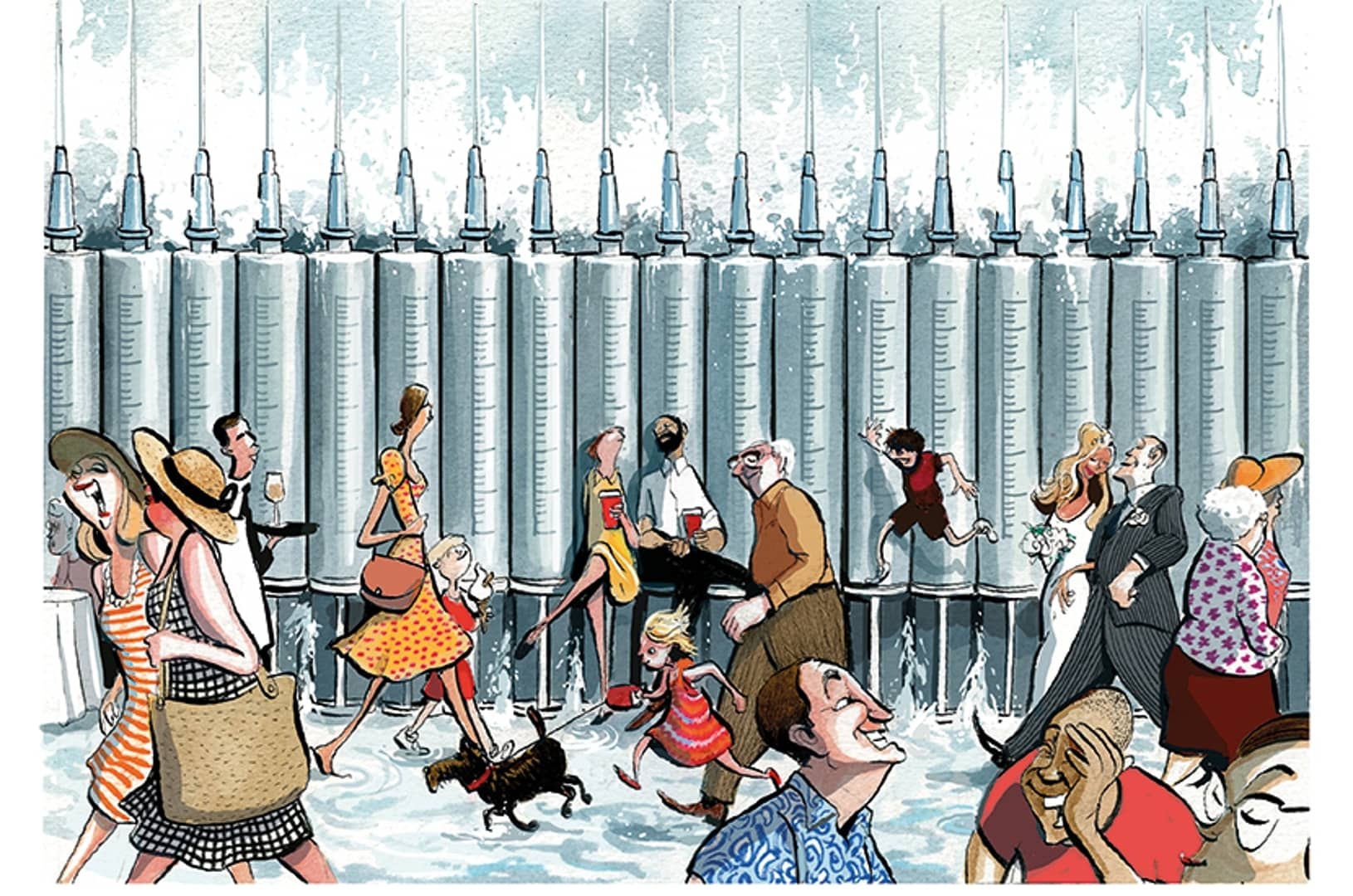It’s hard to remember a time when politicians have so publicly put pressure on the Joint Committee on Vaccination and Immunisation. Even the vaccines minister, Nadhim Zahawi, said this week that the booster programme is his ‘absolute priority’ as it will ‘help us to transition the virus from pandemic to endemic status’. So why is the JCVI so against booster jabs in all but the rarest of cases? My understanding is that its thinking has three parts. First, that the UK has not experienced Israel’s waning immunity against infection because we have had a longer gap between doses. Second, the AstraZeneca vaccine, which has been widely used here but not in Israel, provides longer-term immunity against infection than the Pfizer jab, which has been deployed in both countries. And third, although not explicitly stated, the belief we shouldn’t be using vaccines here when much of the world is unvaccinated.
The JCVI chairman, Professor Sir Andrew Pollard, hasn’t been shy in publicly arguing against booster shots. While he recused himself from all of JCVI’s Covid meetings, he says the developing world has greater need. I am told his thinking has influenced other committee members. So while the JCVI will not take a wider view on the effect of vaccinating children in the community in the UK, it seems happy to deny boosters to the UK because of the lack of vaccines available globally.
There are problems with each of these assumptions. There’s strong evidence of waning infection immunity in the UK: recent published studies from Oxford University and King’s College London have demonstrated this. Yes, Israel’s problem is more advanced than ours, but the pandemic has taught us that countries don’t suffer in lockstep — winter in the UK isn’t the same as autumn in Israel. The Oxford data showed, too, that immunity from the Pfizer vaccine was initially more potent than AstraZeneca’s; it dropped more rapidly, but that doesn’t mean it will continue to do so at the same rate. Immunity is waning. If the JCVI waits for perfect datasets before acting, we may all end up paying the price.
It’s entirely possible we’ll look back on this moment with deep regret. We’ve recently seen infection numbers in Scotland rocket. The amount of occupied Scottish hospital beds has already more than doubled in a couple of weeks. Meanwhile, one in 75 people in the UK has the virus today, according to the Office for National Statistics. And infections in England are running at more than 20 times the number they were this time last year when there were no vaccines and following months of restrictions. With the return of schools and universities and the autumn weather arriving, we could very well see a big rise in hospital admissions soon.
The vaccines blunt the threat posed by the Delta variant, but they don’t eliminate it
Many find this a difficult notion — vaccines were supposed to end the pandemic, after all. A fundamental issue, however, is that earlier this year, in a desire to provide good news and to encourage people to get vaccinated, some politicians and journalists pushed the boundaries of credibility about what the vaccines could actually do. Yes, they are impressive against severe forms of disease, but they don’t stop the virus circulating as effectively as initially claimed.
Where Israel led the world in vaccinating a large proportion of its population, it now leads the world in seeing that immunity decay. Infections and hospitalisations climbed, as did deaths, but with the latter remaining lower than for previous waves of infection; the vaccines blunt the threat posed by the Delta variant, but they don’t eliminate it.
But focusing solely on deaths is glib, and ignores the threat posed by Covid. We didn’t have lockdowns specifically to reduce the number of people killed by the virus — that was almost a fringe benefit. As crazy as that sounds, we had them to prevent our healthcare system being overrun. Hospitals cannot work if they are filled with Covid patients struggling to breathe. Fill intensive care with these patients and there won’t be room for someone who has had a stroke or a car crash. Fill the regular wards with them and they pose a threat to other patients, and not just chemotherapy patients who have compromised immune systems. Anyone who has had an operation will have an impaired immune system for some time afterwards. Morphine and tramadol, common post-surgery painkillers, weaken the immune system. Give someone who is recovering from surgery Covid and there is a very real chance they will die. Covid patients not only take up valuable bed space, they also require special management to protect others. With community infection numbers so high, this isn’t a straightforward task for hospitals.
In Israel, 60 per cent of Covid hospital admissions are people who have been double vaccinated. In a population where 20 per cent of adults aren’t vaccinated, this is clearly a problem. It correlates with observations made in the UK that antibody levels drop a few months after receiving either the Pfizer or AstraZeneca vaccines. Similarly, the defence against infection appears to be dwindling here too. All this strongly suggests that the protection provided by the current crop of vaccines is transient and needs to be topped up, perhaps repeatedly.
In Israel the use of booster jabs resulted in a greater than tenfold reduction in the relative risk of severe disease, and an 11-fold reduction in relative risk of getting infected. For all the talk of the vaccine providing weaker than expected protection against transmission of the Delta variant, if you don’t catch the virus, you can’t pass it on to anyone else.
The booster jabs have also kept hospitalisations down in Israel. Last Sunday, there were 1,096 Covid patients in hospital, 54 per cent below their peak of 2,387 on 17 January. But because they only use Pfizer, our experience won’t be a carbon copy (while millions received Pfizer here, we’ve also used AstraZeneca and Moderna).
If boosters are employed here, a clear strategy of who gets what and when will be needed. Give people a third dose too early and their boosted immunity may well end up waning again too early. Professor Salman Zarka, Israel’s chief Covid officer, has already said his country needs to prepare for a fourth dose. The UK government recently ordered 35 million doses of the Pfizer vaccine for delivery in the second half of next year. If this isn’t to give people booster jabs, then what’s it for?
The government’s booster programme may well end up being overturned by the force of an incoming wave of infections, or politicians may just circumvent the JCVI’s advice, citing exceptional circumstances. Legally it isn’t clear what’s possible. But if they can’t do this, another type of political pressure may be brought to bear. The governments of France, Germany and the US are all preparing to give their citizens boosters. If that becomes normal, as other countries get to grips with vaccinating their populations, the UK could end up being an outlier.
The debate over emergency coronavirus legislation will heat up shortly. Opponents fear it will lead to a new round of restrictions over winter. On the current trajectory, that may not be unfounded. There were reports this week that the government is considering a ‘circuit breaker’ lockdown next month if hospital admissions continue on their current trajectory. Admissions to hospital are 80 per cent below the January peak. On Friday there were 7,637 Covid patients in UK hospitals, compared with 39,254 on 18 January. But this is the summer, and on the same date a year ago that number stood at 817. The government has reportedly said it will only act if deaths rise to an equivalent of 50,000 per year. That sounds a lot, but as has been pointed out by Professor Oliver Johnson from the University of Bristol, it amounts to 137 deaths per day. The latest seven-day average is 110 and it is expected to increase shortly.
Unless the JCVI seriously believes that boosters pose a significant risk to the nation’s health, the price of not offering them will be paid in human lives.







Comments